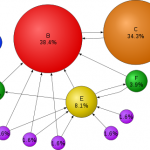Components of The Google Ranking System
http://research.ijcaonline.org/volume40/number4/pxc3877182.pdf
http://www.performancemediaplacement.com/Google-Ranking-Factors.asp
First of all, what defines a highly ranked page? Does it define the reliability of a website or the popularity? Does it rank the highest websites with the most revenue or the the ones that are most relatable based on keywords?
One major factor of search engine rankings is pagerank. Pagerank assigns a rank or score to every search result or web page, and the higher the score, the further up on the query the search results will appear. This is very relevant to search engines such as Google, Yahoo, and Bing. They each use pagerank algorithms to make it easy for consumers to search the worldwide web more efficiently. These scores are not determined independently, in fact they are deteremined by the number of other web pages that link to the target page. Each link is counted as a vote for the target and not all votes are equal.
The logic behind pagerank is that pages with higher quality content will be linked to more often than average pages. Thus links from higher ranking sites will result in a higher pagerank. This makes it difficult for an organization that specializes in Search Engine Optimimizations (SEO) to cheat the system because making a bunch of empty websites linking back to the target page does not help the target’s pagerank very much. Additionally, if a highly ranked page has links to many other websites, then its voting power becomes diluted. Therefore it is possible to have a mediocore ranked page link having only one outgoing link to the target, and have more of an impact than a page that is very highly ranked but has many links to other pages.
Other factors that affect scoring include how long a site has been around. Meaning, pageranks will be higher for sites that have been around for longer. One of the most important factors that play a role in ranking a page is the site content. If the content of the site is high in quality, then chances are it will have many visitors and returning visitors, thus making it a highly ranked page in the search query.
Another positive factor that affects the position of the page is the the use of keywords that are relevant to the page. For example, keywords anywhere in the title tag get the highest tag, whereas keywords in the first 50-100 words is less of a priority, and keywords in the comments sections of the page are an even less priority in terms of ranking the page.
A factor that affects the ranking of pages is the time of year. For example, people that type the keyword “flowers” during the mid of feburary will mostly likely be looking for pages that can direct them to places that they can buy flowers beacuse of valentines day. Whereas the same keyword types in the months of may or june will result in a query that has produts related to planting flowers and information about different flowers to plant.
To summarize, there are 5 main factors to rank a page on a search query: links to and from the site, site content, visitor related factors, time of year, domain name factors or how long the site has been registered. This is a basic description of how a search engine works, but Google has over 200 algorithms that determine the rank of a website on their query, so there are sure to be more factors. When people think of the internet now a days, they think of Google and typing into the search bar, but in reality the world wide web are not just the sites that Google can be linked to. The fact that such a huge portion of the world use Google’s search engine to find information of the web means that they are doing something right.

